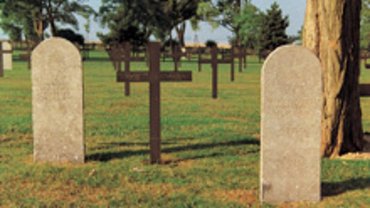
German-Jewish soldiers
Anyone who notices gravestones displaying the Star of David and Hebrew lettering when visiting a German First World War cemetery will be reminded that 100,000 Germans of the Jewish faith were enlisted during the war, 12,000 of whom were to fall.
In the last will and testament of Lieutenant Josef Zürndorfer, an airman who died when his plane crashed on 19.9.1915, we read: “As a German, I joined the war in order to defend my Fatherland, which is under attack. But also, as a Jew, to fight for the absolute equality of my co-religionists.” This longed-for equality failed to materialise. After the war, an accusation of cowardice was levelled at Jewish soldiers by anti-Semites and subsequently National Socialists.
In 1919, the self-help organisation Reichsbund jüdischer Frontsoldaten (Reich Federation of Jewish Front-Line Soldiers) was founded. Issuing leaflets and pamphlets and holding meetings, the Reichsbund laboured hard to educate people about the ultimate sacrifice and military achievements of Jewish front-line combatants. 17,000 of them were awarded the Iron Cross Second Class and 1,000 the Iron Cross First Class; 2,000 were officers and 1,200 were army doctors and military officials. Their ranks also included the Wehrmacht’s youngest volunteer, Josef Zippes; the first member of the flying corps to be awarded the medal Pour le Mérite, Wilhelm Frankl; and Social Democrat member of the Reichstag Dr. Ludwig Frank, a volunteer who fell on the Western Front on 3.9.1914. After 1933, the Reichsbund was hoping that the Jewish front-line soldiers would be exempted from the anti-Jewish measures taken by the Hitler regime. Although initially unaffected by the Law for the Restoration of the Professional Civil Service (Gesetz zur Wiederherstellung des Berufsbeamtentums), their appeal to be allowed to enlist in the army or national labour service was turned down, and in 1935 even Jewish front-line soldiers were dismissed from the civil service. The Reichsbund drew the obvious conclusions from the failure of its policy and henceforth threw its weight behind emigration. Following the Kristallnacht pogrom of 9/10 November 1938, it ceased its activities. Before long, front-line soldiers in the First World War would be among those who perished in the gas chambers of the Holocaust.

Photograph: Of the 500,000 named German soldiers of the First World War buried in France, 3,000 of these war dead were of the Jewish faith. In 1968, the leadership of the Volksbund (German War Graves Commission), in conjunction with the Central Council Of Jews and the Rabbinical Conference in Germany, decided to mark the graves of these dead with stelae. In addition to an engraving of the Star of David and the personal details of the deceased, these stelae also bear a Hebrew inscription, which translates as: “May his soul be bound up in the circle of the living.”